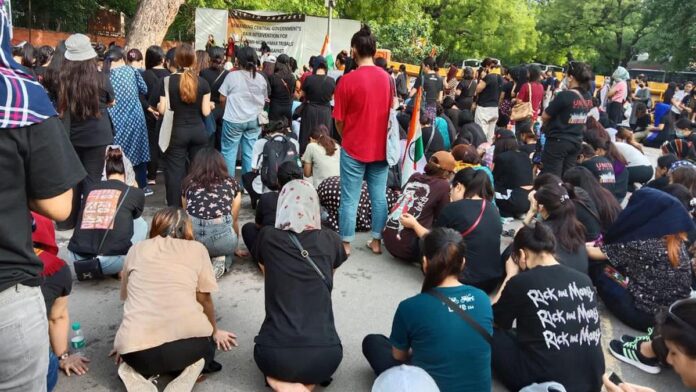In Manipur, the looming Lok Sabha elections have taken on a new dimension with the recent announcement by Kuki women threatening to boycott the electoral process. This bold move, spearheaded by Kuki women leaders, underscores the deep-seated grievances and frustrations within the community and raises important questions about representation, identity, and political participation in the state.
The Kuki community, one of the major ethnic groups in Manipur, has long struggled for recognition and representation in the state’s political landscape. Historically marginalized and often overlooked by mainstream political parties, Kukis have faced challenges in asserting their rights and preserving their cultural heritage in the face of rapid social and political changes.
The decision by Kuki women to boycott the Lok Sabha elections reflects a growing sense of disillusionment and disenchantment with the existing political establishment and its failure to address the concerns of their community. Issues such as land rights, development initiatives, and security concerns have been recurrent themes in Kuki grievances, with successive governments accused of neglecting their needs and interests.
At the heart of the boycott threat lies a demand for greater political empowerment and representation for Kuki women in decision-making processes. Despite being active participants in their communities and playing key roles in various spheres of life, Kuki women have often found themselves sidelined in formal political institutions, with limited opportunities to influence policy decisions that affect their lives.
The boycott threat serves as a powerful assertion of agency and a demand for meaningful inclusion in the political process. By leveraging their collective voice and mobilizing around a common cause, Kuki women are challenging the status quo and seeking to redefine the terms of engagement with political authorities and institutions.
The implications of the boycott threat are significant, both for the upcoming Lok Sabha elections and for the broader political landscape in Manipur. A boycott by Kuki women could potentially undermine the legitimacy of the electoral process and send a strong message to political parties about the need to address the concerns of marginalized communities.
Furthermore, it could galvanize other marginalized groups in Manipur to demand greater representation and accountability from political leaders. The boycott threat has the potential to spark broader conversations about identity, diversity, and social justice in the state, paving the way for more inclusive and participatory forms of governance.
However, while the boycott threat highlights legitimate grievances and aspirations within the Kuki community, it also raises questions about the efficacy of such a strategy in achieving meaningful change. Some critics argue that boycotting elections may ultimately disenfranchise the very communities that seek to assert their rights, depriving them of a crucial opportunity to influence political outcomes and hold elected representatives accountable.
Moreover, there is a risk that a boycott could further marginalize Kuki interests and exacerbate existing divisions within the community. In a state marked by complex ethnic dynamics and historical tensions, finding common ground and forging alliances across ethnic lines is essential for building a more inclusive and cohesive society.
In light of these considerations, it is crucial for all stakeholders, including Kuki women leaders, political parties, and civil society organizations, to engage in constructive dialogue and explore alternative avenues for addressing the concerns of marginalized communities. This may include advocating for legislative reforms, strengthening grassroots mobilization efforts, and fostering greater collaboration between communities and state institutions.
Ultimately, the boycott threat by Kuki women in Manipur represents a bold assertion of agency and a demand for greater political recognition and representation. While the implications of this move are complex and multifaceted, it underscores the urgent need for inclusive and participatory forms of governance that reflect the diverse aspirations and identities of all communities in Manipur. As the state prepares for the Lok Sabha elections, the voices of Kuki women serve as a poignant reminder of the ongoing struggle for social justice and equality in the region.



